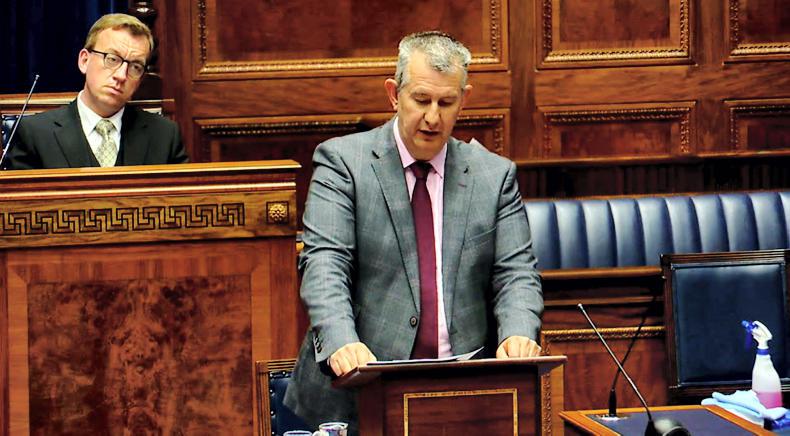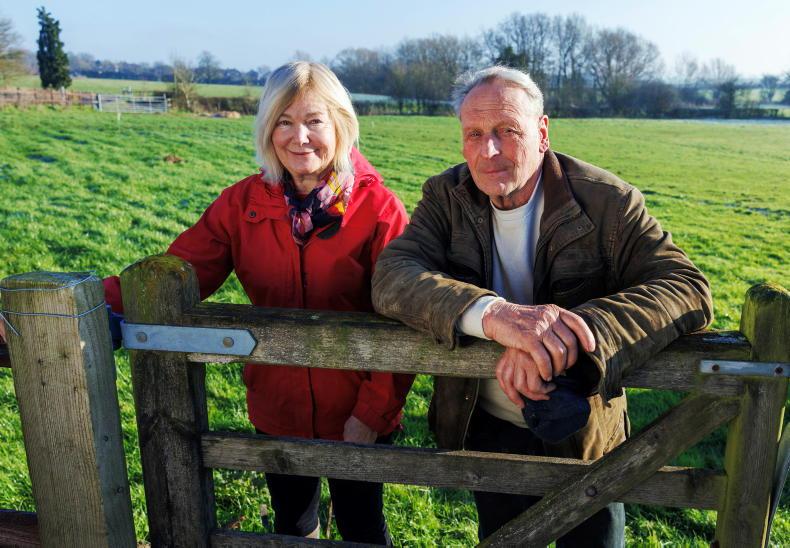Three years after government collapsed at Stormont, a 62-page deal entitled New Decade, New Approach has been tabled by the British and Irish governments.
While much of the media spotlight is inevitably on revisions to the Stormont petition of concern and issues around Irish and Ulster Scots identity, looking through the priorities set out for a new executive, it is clear some will have a lasting impact on NI farmers.
In particular, there are a number of references in the document to climate change, with a commitment to introduce a climate change act to legally underpin new environmental targets.
Independent agency
An independent environmental protection agency will then be established to ensure these targets are met.
Given the lack of a manufacturing base in NI, agriculture is much more important to the NI economy than it would be in other regions of the UK.
Legislation that requires emissions to be cut will directly impact on farming
As a result, 28% of greenhouse gas emissions in NI come from agriculture, so legislation that requires emissions to be cut will directly impact on farming.
Regarding the proposed independent environmental protection agency, this has been mooted for a number of years.
In 2015, then-environment minister Mark H Durkan proposed that a new structure be established, in line with other parts of Britain and Ireland.
However, that plan was opposed by the UFU, which highlighted concerns about more bureaucracy and potentially more costs on industry.
In 2016, DAERA minister Michelle McIlveen confirmed that she would not be establishing the new environmental body, but instead would appoint independent members to the board of the NI environment agency (which is part of DAERA).
RHI
There is also a brief reference in the draft text from the two governments to the renewable heat incentive (RHI) scheme, and a commitment that it will be closed down (Sinn Féin called for this in January 2019) and replaced by “a scheme that effectively cuts carbon emissions”.
Brexit
On the issue of Brexit, a new Stormont Executive will establish a sub-committee (chaired by the First Minister or Deputy First Minister) to consider Brexit-related issues.
There are also a number of related commitments from the British government, including that it will ensure that representatives from the Stormont Executive are included as part of the UK delegation in any meetings of the UK-EU specialised or joint committees (when discussing NI matters).
These committees will effectively oversee the application of the UK-EU withdrawal agreement.
In addition, on the specific NI protocol within the withdrawal agreement, there is an important commitment that the UK government will legislate to guarantee unfettered access for NI business to the internal UK market.
Made in NI
When it comes to future trade opportunities, it is now over four years since the former enterprise minister Arlene Foster announced that a new agri-food marketing body would be set up in NI. To date, that has not happened, much to the frustration of the sector.
In the draft text published this week, while a new marketing body is not specifically mentioned, there is a proposal to establish a new trade advisory body, and a ‘Made in NI’ campaign.
Irish government
There are also some commitments made by the Irish government, including that it will deliver on its funding for various infrastructure projects, including a total of £75m (€88m) up to 2022 for the A5 road project between Newbuildings and Strabane in the northwest.
Read more
Listen: UK will uphold import standards post-Brexit –Defra
Villiers to re-introduce agriculture bill this month
Three years after government collapsed at Stormont, a 62-page deal entitled New Decade, New Approach has been tabled by the British and Irish governments.
While much of the media spotlight is inevitably on revisions to the Stormont petition of concern and issues around Irish and Ulster Scots identity, looking through the priorities set out for a new executive, it is clear some will have a lasting impact on NI farmers.
In particular, there are a number of references in the document to climate change, with a commitment to introduce a climate change act to legally underpin new environmental targets.
Independent agency
An independent environmental protection agency will then be established to ensure these targets are met.
Given the lack of a manufacturing base in NI, agriculture is much more important to the NI economy than it would be in other regions of the UK.
Legislation that requires emissions to be cut will directly impact on farming
As a result, 28% of greenhouse gas emissions in NI come from agriculture, so legislation that requires emissions to be cut will directly impact on farming.
Regarding the proposed independent environmental protection agency, this has been mooted for a number of years.
In 2015, then-environment minister Mark H Durkan proposed that a new structure be established, in line with other parts of Britain and Ireland.
However, that plan was opposed by the UFU, which highlighted concerns about more bureaucracy and potentially more costs on industry.
In 2016, DAERA minister Michelle McIlveen confirmed that she would not be establishing the new environmental body, but instead would appoint independent members to the board of the NI environment agency (which is part of DAERA).
RHI
There is also a brief reference in the draft text from the two governments to the renewable heat incentive (RHI) scheme, and a commitment that it will be closed down (Sinn Féin called for this in January 2019) and replaced by “a scheme that effectively cuts carbon emissions”.
Brexit
On the issue of Brexit, a new Stormont Executive will establish a sub-committee (chaired by the First Minister or Deputy First Minister) to consider Brexit-related issues.
There are also a number of related commitments from the British government, including that it will ensure that representatives from the Stormont Executive are included as part of the UK delegation in any meetings of the UK-EU specialised or joint committees (when discussing NI matters).
These committees will effectively oversee the application of the UK-EU withdrawal agreement.
In addition, on the specific NI protocol within the withdrawal agreement, there is an important commitment that the UK government will legislate to guarantee unfettered access for NI business to the internal UK market.
Made in NI
When it comes to future trade opportunities, it is now over four years since the former enterprise minister Arlene Foster announced that a new agri-food marketing body would be set up in NI. To date, that has not happened, much to the frustration of the sector.
In the draft text published this week, while a new marketing body is not specifically mentioned, there is a proposal to establish a new trade advisory body, and a ‘Made in NI’ campaign.
Irish government
There are also some commitments made by the Irish government, including that it will deliver on its funding for various infrastructure projects, including a total of £75m (€88m) up to 2022 for the A5 road project between Newbuildings and Strabane in the northwest.
Read more
Listen: UK will uphold import standards post-Brexit –Defra
Villiers to re-introduce agriculture bill this month









SHARING OPTIONS